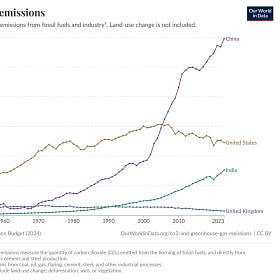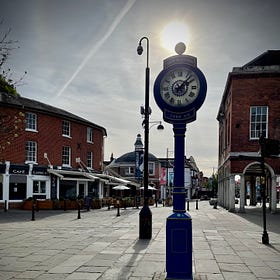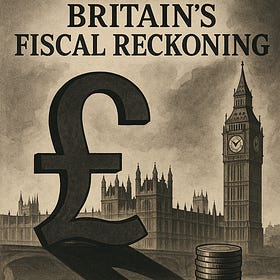We will remember them.
Freedom is worth fighting for. A failing managerial state with poor quality unaffordable public services, one which silences dissent, isn't. Veteran Alec Penstone reminded us so. We should hear him.
“The sacrifice wasn’t worth the result it is now. […] What we fought for was our freedom, we find now it’s a darn sight worse than what it was when I fought for it.”
100-year-old World War II Veteran Alec Penstone gives a damning verdict on modern Britain, via Turning Point UK on X.
When 100-year-old World War II Veteran Alec Penstone said the sacrifice of the Second World War wasn’t worth it for today’s outcome, I think the interviewer was shocked. Of course, she was: it’s something the rest of us cannot say out loud. And of course it was worth it at the time.
In February 2025, The Times reported, “Only 11 per cent would fight for Britain — and 41 per cent said there were no circumstances at all in which they would take up arms for their country”. Respondents cited the UK’s racism, and yet the evidence is that:
In general, people living in the UK are relatively tolerant towards immigrants. […] The share of people expressing prejudice towards migrants in Britain was one of the lowest in the world and notably smaller than in other democracies like Japan (30%), Greece (26%), Italy (18%), and even France (10%).
I confess I have at times felt despondent for our country myself, but for different reasons: I could never have imagined how rotten our governing elite has become, how plain that rottenness would be and how little public outcry there is over it. I cite, for example, four topics: leaving the European Union, the pandemic response, Net Zero, and the public finances. Across these subjects and more I do not have space to cover, it is time to get a grip and create a more hopeful future through the principles of a free society.
It’s one thing to genuinely believe in the project of European political integration and make the case for it honestly. It is another to lie about it and drive through the Constitution for Europe by another name in order to avoid seeking democratic consent, knowing it is likely to be withheld: that is what was done, and large numbers of politicians and officials were complicit in it. And it is yet another thing to attempt to avoid by subterfuge the necessary consequences of a public decision to leave those institutions and that jurisdiction. But our governing and intellectual elite overwhelmingly did just that. We must be reconciled, but I shall never understand those for whom the basic requirement of democracy – that power can be removed peacefully at the ballot box, to avoid having to do it the other way – has fallen so far in their hierarchy of values.
And then we were locked down at home, initially on the strength of a Prime Ministerial press conference, not even a change in the law. The law and police enforcement of it became oppressive beyond the most fearful imaginings of a reasonable person. And yet the elite consensus was for longer, harder restrictions on freedom. I spoke out at the time, organising the only systematic parliamentary opposition in the UK - the Covid Recovery Group - focusing on the cost of lockdowns and restrictions: now they are plain to all with a collapse in mental health of young people and soaring worklessness. Fraser Nelson has written that the number of under-25s on out-of-work sickness benefit is up 50% in five years: that is, since the start of the pandemic. Somehow our elite was in favour of this and wanted to go further…
We read that the BBC is to review bias in climate change coverage. Hooray! About time. I will defend my views on Net Zero and climate change all day long: they were meticulously researched before I joined the board of the Global Warming Policy Foundation and launched the Net Zero Scrutiny Group of Conservative MPs with now Lord Craig Mackinlay. And yet somehow those who shape the terrain of public debate were unable to engage on the facts and substance of the argument. Once again, I was isolated, but now look right.
Energy policy – change is coming
Conservative leader Kemi Badenoch has made headlines by declaring the UK's Net Zero 2050 target "impossible," promising instead to "maximise extraction" from the North Sea and remove all climate requirements on oil and gas companies.
Racism: to hate someone because of their identity is a wicked thing, and even today, people suffer by it. People ought to be treated equally: morally, politically and legally. No other approach should be tolerated. And yet, scandalously, our intelligence and security services today discriminate against white people and have continued doing so despite public outcry. Astonishingly, the very institutions which were once meant to prevent the UK being subverted by doctrines dangerous to freedom have themselves now accepted ideas which overthrow a fundamental principle of a free society: equality of all before the law. And when the public complain – perhaps angrily, even clumsily – about these and other consequences of adopting what were once decried as “loony left” ideologies, they may face a knock on the door from the police for their opinions. It is reminiscent of the notorious practices of totalitarian East Germany. By all means, let us oppose hateful thoughts and words, always standing for what is right, but let us do it by debate, not through application of the police power, with all that entails, when instead police officers should be battling violent crime, theft and fraud.
Racism is running riot
There is never any excuse for rioting and racism. It is also true that large numbers of people have legitimate grievances which have not been adequately addressed. A distinction must be drawn.
And then there is the issue of the public finances. Authors have repeatedly written on Voices for a Free Future that we are heading for disaster. Find my paper for Axiom here, setting out key evidence, and my book with Max Rangeley showing that we are in history’s biggest bubble, here. Somehow, politicians, officials – even those creating forecasts of disaster! – journalists and opinion formers manage to avoid saying what would be unpopular: we must cut spending and go for growth with tax cuts and deregulation if we are to have a hopeful future. The alternative may be the destruction of our currencies, the rise of political radicalism and calamity, once again, but this time with no one to fight back: all the developed welfare states are in the same boat.
Britain's Fiscal Reckoning: The Inevitability of Spending Cuts
Deep and significant spending cuts are inevitable in the UK. Politicians who say otherwise are either blind to reality or lying.
This Remembrance Day, there is much to fulminate against and much to reflect upon. War is the enemy of everything we hold dear. It negates life, liberty and the pursuit of happiness. It leaves death, poverty, and misery in its wake. And yet – paradoxically – it is our willingness to prepare for and, if needed, to wage war in defence that underwrites the very freedoms we cherish. History is clear: those unwilling or unable to defend themselves have depended on others’ resolve for their safety and autonomy.
But I remember now, as so often, something Disraeli said:
Despair is the conclusion of fools.
I also remember the young adults it is my privilege to know in the generations after my own, who I am certain would rise to the challenge of defending a free future even at the cost of their own lives. We are blessed indeed to have them amongst us, though I would plead, “Send the fit middle-aged first!” But that is for another day.
At 11:00, as always, I shall stand in silence to remember those who fought for freedom and how we have failed them. And this year I shall also stand for Mr Alec Penstone, the brave veteran who implied what is so often neglected: we should all be fighting for a free future.





